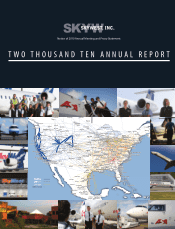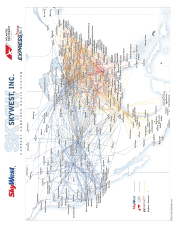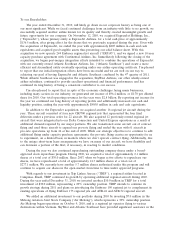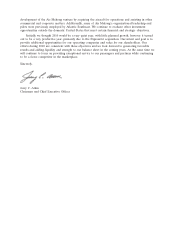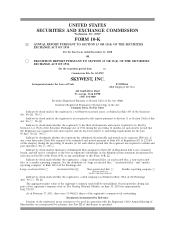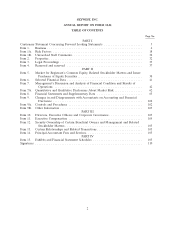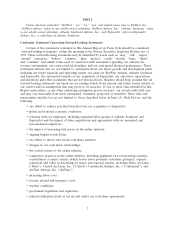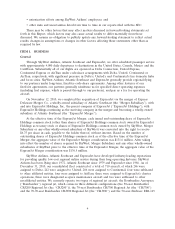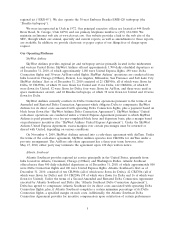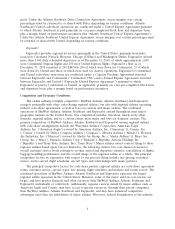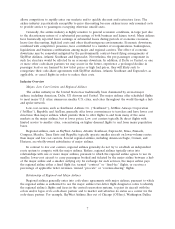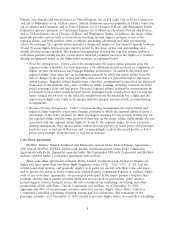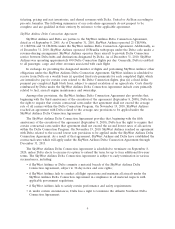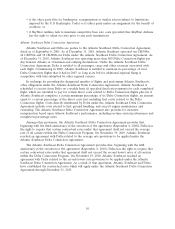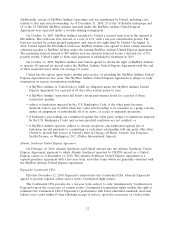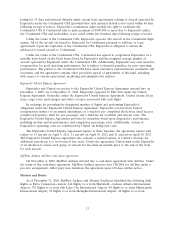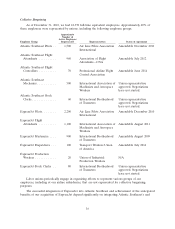SkyWest Airlines 2010 Annual Report Download - page 10
Download and view the complete annual report
Please find page 10 of the 2010 SkyWest Airlines annual report below. You can navigate through the pages in the report by either clicking on the pages listed below, or by using the keyword search tool below to find specific information within the annual report.goals. Under the Atlantic Southeast Delta Connection Agreement, excess margins over certain
percentages must be returned to or shared with Delta, depending on various conditions. Atlantic
Southeast’s United code-share operations are conducted under a United Express Agreement pursuant
to which Atlantic Southeast is paid primarily on a fee-per-completed block hour and departure basis,
plus a margin based on performance incentives (the ‘‘Atlantic Southeast United Express Agreement’’).
Under the Atlantic Southeast United Express Agreement, excess margins over certain percentages must
be returned or shared with United, depending on various conditions.
ExpressJet
ExpressJet provides regional jet service principally in the United States, primarily from hubs
located in Cleveland, Newark, Houston, Chicago (O’Hare) and Washington Dulles. ExpressJet offered
more than 1,300 daily scheduled departures as of December 31, 2010, of which approximately 1,050
were Continental Express flights and 250 were United Express flights. ExpressJet’s fleet as of
December 31, 2010 consisted of 244 ERJ145s 206 of which were flown for Continental, 35 of which
were flown for United and three of which were used for charter operations. ExpressJet’s Continental
and United code-share operations are conducted under a Capacity Purchase Agreement executed
between ExpressJet and Continental (‘‘Continental CPA’’) and a United Express Agreement executed
between ExpressJet and United (‘‘ExpressJet United Express Agreement’’) pursuant to which
ExpressJet is paid by Continental or United, as applicable, primarily on a fee-per-completed block hour
and departure basis, plus a margin based on performance incentives.
Competition and Economic Conditions
The airline industry is highly competitive. SkyWest Airlines, Atlantic Southeast and ExpressJet
compete principally with other code-sharing regional airlines, but also with regional airlines operating
without code-share agreements, as well as low-cost carriers and major airlines. The combined
operations of SkyWest Airlines, Atlantic Southeast and ExpressJet extend throughout most major
geographic markets in the United States. Our competition includes, therefore, nearly every other
domestic regional airline, and to a certain extent, most major and low-cost domestic carriers. The
primary competitors of SkyWest Airlines, Atlantic Southeast and ExpressJet among regional airlines
with code-share arrangements include Air Wisconsin Airlines Corporation, American Eagle
Airlines, Inc. (‘‘American Eagle’’) (owned by American Airlines, Inc. (‘‘American’’)), Comair, Inc.
(‘‘Comair’’) (owned by Delta), Compass Airlines (‘‘Compass’’), Mesaba Airlines (‘‘Mesaba’’), Horizon
Air Industries, Inc. (‘‘Horizon’’) (owned by Alaska Air Group, Inc. (‘‘Alaska Airlines’’)), Mesa Air
Group, Inc. (‘‘Mesa’’), Pinnacle Airlines Corp. (‘‘Pinnacle’’), Republic Airways Holdings Inc.
(‘‘Republic’’) and Trans State Airlines, Inc.(‘‘Trans State’’) Major airlines award contract flying to these
regional airlines based upon, but not limited to, the following criteria: low cost, financial resources,
overall customer service levels relating to on-time arrival and departure statistics, cancellation of flights,
baggage handling performance and the overall image of the regional airline as a whole. The principal
competitive factors we experience with respect to our pro-rate flying include fare pricing, customer
service, routes served, flight schedules, aircraft types and relationships with major partners.
The principal competitive factors for code-share partner regional airlines are code-share agreement
terms, customer service, aircraft types, fare pricing, flight schedules and markets and routes served. The
combined operations of SkyWest Airlines, Atlantic Southeast and ExpressJet represent the largest
regional airline operation in the United States. However, some of the major and low-cost carriers are
larger, and have greater financial and other resources than SkyWest Airlines, Atlantic Southeast and
ExpressJet, individually or collectively. Additionally, regional carriers owned by major airlines, such as
American Eagle and Comair, may have access to greater resources, through their parent companies,
than SkyWest Airlines, Atlantic Southeast and ExpressJet, and may have enhanced competitive
advantages since they are subsidiaries of major airlines. Moreover, federal deregulation of the industry
6

